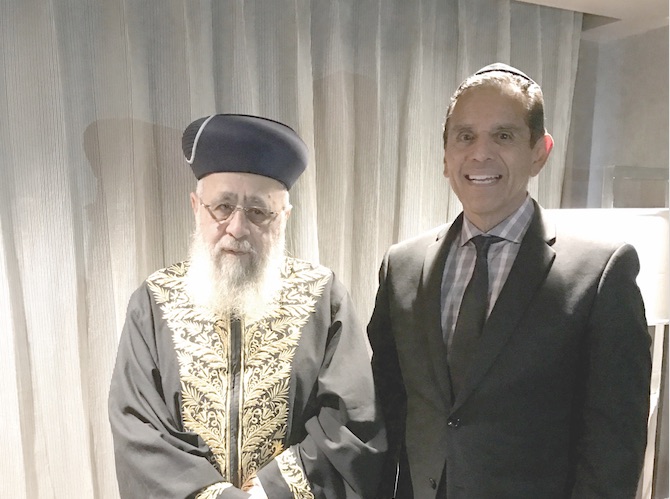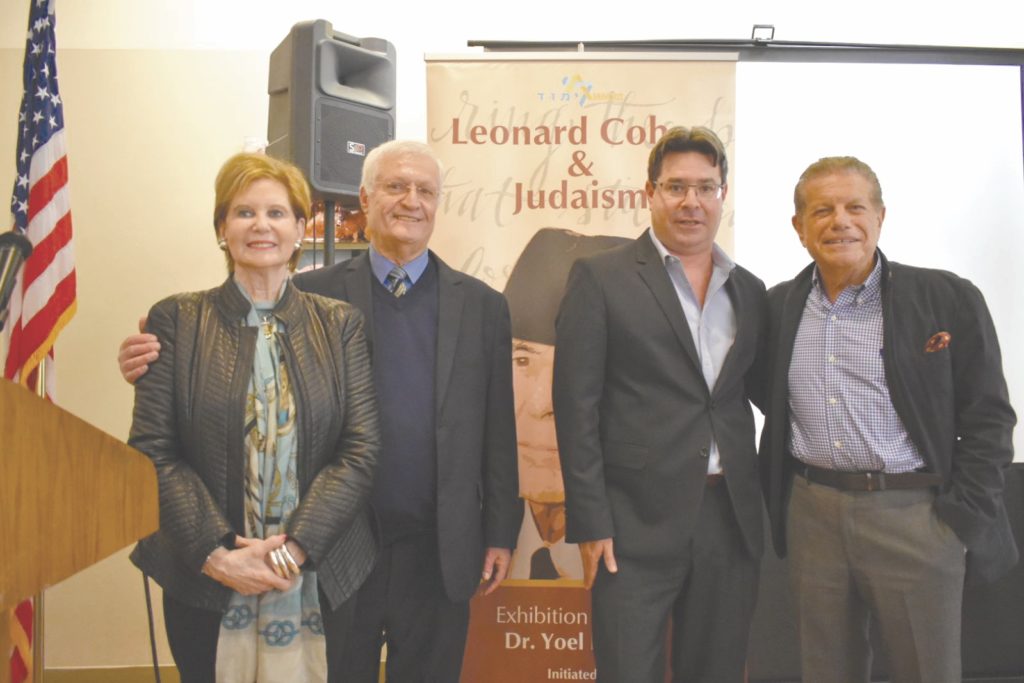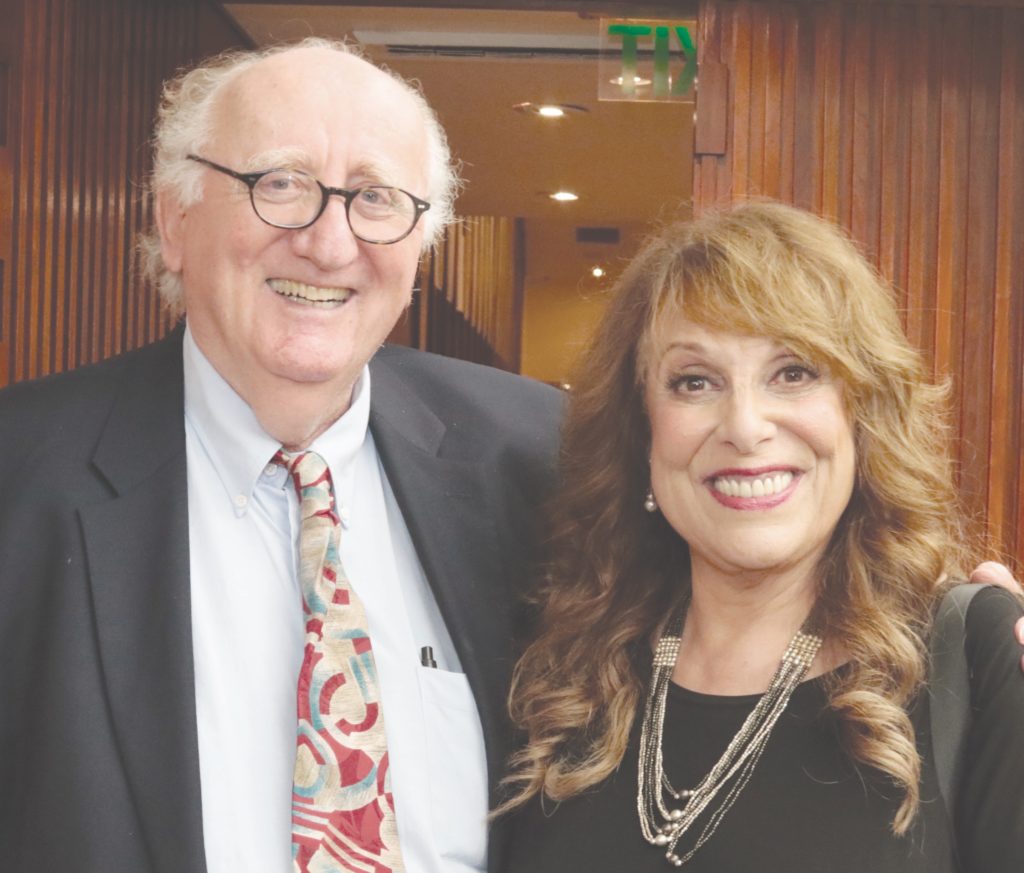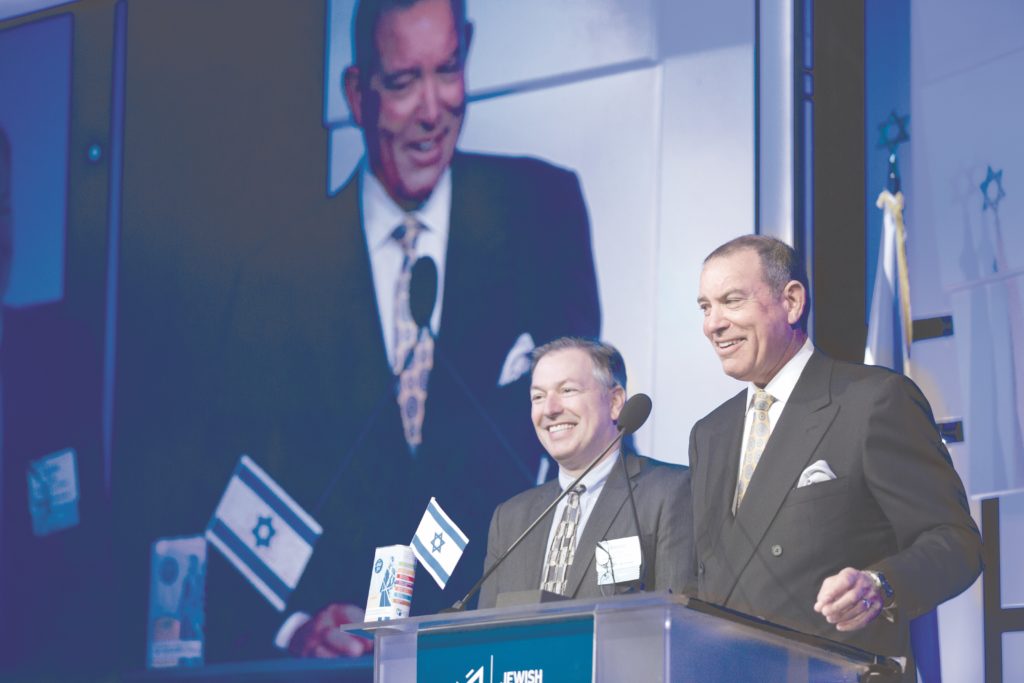 Israel’s Chief Sephardic Rabbi, Yitzhak Yosef, and former L.A. Mayor and current California gubernatorial candidate Antonio Villaraigosa meet in Los Angeles. They had a private conversation about Israel and other topics. Photo courtesy of Congregation Mogen David Rabbi Yehuda Moses
Israel’s Chief Sephardic Rabbi, Yitzhak Yosef, and former L.A. Mayor and current California gubernatorial candidate Antonio Villaraigosa meet in Los Angeles. They had a private conversation about Israel and other topics. Photo courtesy of Congregation Mogen David Rabbi Yehuda Moses Israel’s chief Sephardic rabbi, Yitzhak Yosef, visited Los Angeles from Nov. 21-26 and met with many community members and leaders, including former L.A. mayor and current gubernatorial candidate Antonio Villaraigosa.
During a meeting in the rabbi’s hotel room, Villaraigosa, who is running in the 2018 California gubernatorial race, asked the Hebrew-speaking rabbi for a blessing. The two leaders also discussed pluralism issues facing Israel in light of the Reform movement’s efforts to create a mixed prayer space at the Western Wall.
“It was a very interesting conversation,” Congregation Mogen David Rabbi Yehuda Moses said. “I was in the room. I thought it would be a two-minute conversation. It was a 15-minute conversation.”
Yosef’s trip was coordinated by Moses, who received rabbinic ordination from Yosef’s late father, former chief Sephardic rabbi of Israel Ovadia Yosef. It was the first time Yosef visited Los Angeles since his appointment in 2013.
The chief rabbi, author of books on Jewish law important to the Sephardic and Mizrahi communities, also met with Chabad of California Rabbi Baruch Shlomo Cunin; Rabbi David Zargari of Torat Hayim; Nessah Congregation Chief Rabbi David Shofet; and Rabbi Netanel Louie of the Eretz Cultural Center.
Yosef also spoke to about 700 representatives of the Sephardic community at the Eretz Cultural Center in Tarzana. “He strengthened the whole community,”
Moses said.

A Nov. 14 event at Hillel at UCLA lauded the late singer-songwriter Leonard Cohen and his Jewish roots. “Leonard Cohen and Judaism” was hosted by the organization Limmud FSU and included speeches touting Cohen’s legacy and the singing of his hit song “Hallelujah” by actor-singer Mike Burstyn.
Cohen died on Nov. 7, 2016, in his Los Angeles home at the age of 82.
Limmud FSU, an organization dedicated to connecting Jews from the former Soviet Union with their roots, hosted the event in part because of Cohen’s Eastern European heritage. Chaim Chessler, the organization’s founder, pointed out that Cohen’s mother and paternal grandfather were from the region.
The event included a rendition of “Promise,” an unreleased song by Cohen that was performed by local musician Willie Aron, who co-produced it.
“When the world is false, I won’t say it’s true,” Aron sang. “When the darkness comes, I’ll be there with you.”
Speeches addressed Cohen’s connection with Judaism and the liturgical roots in many of his lyrics.
Cohen taught that “in order for us to be whole, we have to realize the shadow, the darkness, and not hide from it,” said Rabbi Mel Gottlieb, president of the Academy for Jewish Religion California, a transdenominational seminary that shares a building with Hillel.
Ofir Akunis, a Likud member of the Knesset and Israeli minister of science, technology and space, also spoke at the event, calling Cohen “one of the greatest artists of all time” and applauding his “tight connections to the Jewish people.” Akunis referenced Cohen’s 1973 trip to Israel to perform for soldiers during the Yom Kippur War as a sign of the artist’s connection with the Jewish state.
Rabbi Chaim Seidler-Feller, director emeritus of Hillel at UCLA, praised Cohen’s ability to combine Judaism and universalism. “Cohen translated Judaism through music,” he said, “and ask any musician, music transcends boundaries. … He was our rebbe.”
— Eitan Arom, Senior Writer

The Mensch International Foundation honored four community members with the Mensch Award on Nov. 27 at Sinai Temple.
The honorees were Michael Berenbaum, professor of Jewish Studies at American Jewish University; Zane Buzby, founder of the Survivor Mitzvah Project; former Sinai Temple Rabbi Zvi Dershowitz, who served there for 47 years; and Meir Fenigstein, president and founder of the Israel Film Festival in Los Angeles.
“The first award I received was the Silver Angel Award, 37 years ago,” Berenbaum said. “I told my mother about it and she said, ‘I already know you are an angel, but now you should try to be a mensch.’ And here I am today, a real mensch.”
Steven Geiger established the foundation 15 years ago in Hungary, where he was born. The organization’s goal is to raise money to support Holocaust survivors in need and to combat anti-Semitism and stereotyping through education.
Geiger has named many well-known figures as recipients of the Mensch Award, including former U.S. President George H.W. Bush, Rabbi Israel Meir Lau and former president of Israel Yitzhak Navon.
Actress Frances Fisher introduced Buzby, an actress, film director and philanthropist who then screened a short video documenting the harsh conditions facing Holocaust survivors living in
Eastern Europe.
“I founded the Survivor Mitzvah Project to change their lives, but they are the ones who changed mine,” she said.
Dershowitz was born in Czechoslovakia in 1928 and fled the country with his family 33 days before the Nazi invasion. The family settled in New York City. Dershowitz, who also served as a chaplain in the Southern California prison system for many years, said the award actually “belongs to my parents, who were the real mensches.”
Fenigstein was moved to tears as he recalled his parents, both of whom were Holocaust survivors. “Their love and support gave me the energy to follow
my passion, and I’m here because of them,” he said. “They would have been very proud of me if they saw me
here today.”
The event commemorated the 70th anniversary of United Nations Resolution 181, which was passed by the U.N. General Assembly on Nov. 29, 1947, and called for the partition of Palestine into Arab and Jewish states.
A panel discussion about the U.N. resolution followed the award ceremony. The speakers were Berenbaum, UCLA professor Judea Pearl, Chapman University law professor Michael Bazyler and Rabbi Moshe Kushman.
— Ayala Or-El, Contributing Writer

More than 1,000 invited guests attended the sold-out 12th annual Jewish National Fund (JNF) Los Angeles Breakfast for Israel on Nov. 28 at the Beverly Hilton in Beverly Hills.
Guest speakers included author and radio commentator Larry Elder and Chemi Shalev, senior columnist and U.S. analyst for the Israeli Haaretz newspaper. The topic was “Media Bias & Israel.” More than 60 table captains and partner organizations helped to bring a cross section of
civic and Jewish community members to the event.
Additional participants in the program included Consul General of Israel in Los Angeles Sam Grundwerg and event co-chairs Douglas Williams and Barak Lurie.
JNF is a nonprofit organization focused on alleviating Israel’s water shortage, promoting education, maintaining more than 250,000 acres of forest in Israel,
and more.

Humanitarian and Roman Catholic priest Father Patrick Desbois appeared in conversation with Heritage Retreats’ Rabbi Mordechai Kreitenberg and philanthropist Mitchell Julis at the Museum of Tolerance’s Peltz Theater on Nov. 7.
Desbois, president of Yahad-In Unum, an organization dedicated to identifying and commemorating sites of Jewish mass executions in Eastern Europe during World War II, shared his experiences documenting genocides and educating for their prevention.
“It is a big challenge to be a believer in God while living with open eyes, but it is part of that belief to cry out,” said Desbois, author of “The Holocaust by Bullets: A Priest’s Journey to Uncover the Truth Behind the Murder of 1.5 Million Jews.” “Searching for these victims who are waiting to be found is an act of faith.”
The panel opened with a video introducing Desbois’ work and contextualizing its importance in light of contemporary anti-Semitism and Holocaust denial. A Q-and-A session with the audience followed the discussion.
Heritage Retreats, which provides young Jewish adults with an opportunity to engage with Judaism in outdoor wilderness settings, organized the event.
The group plans to lead trips to Poland, where participants will visit the massacre sites identified by Desbois and meet witnesses whom he has interviewed near Krakow.























 More news and opinions than at a Shabbat dinner, right in your inbox.
More news and opinions than at a Shabbat dinner, right in your inbox.